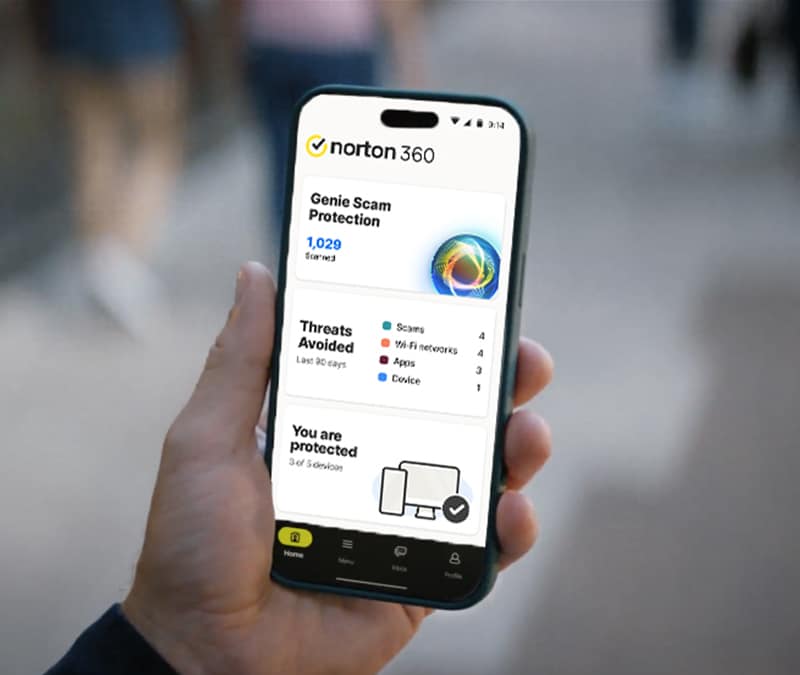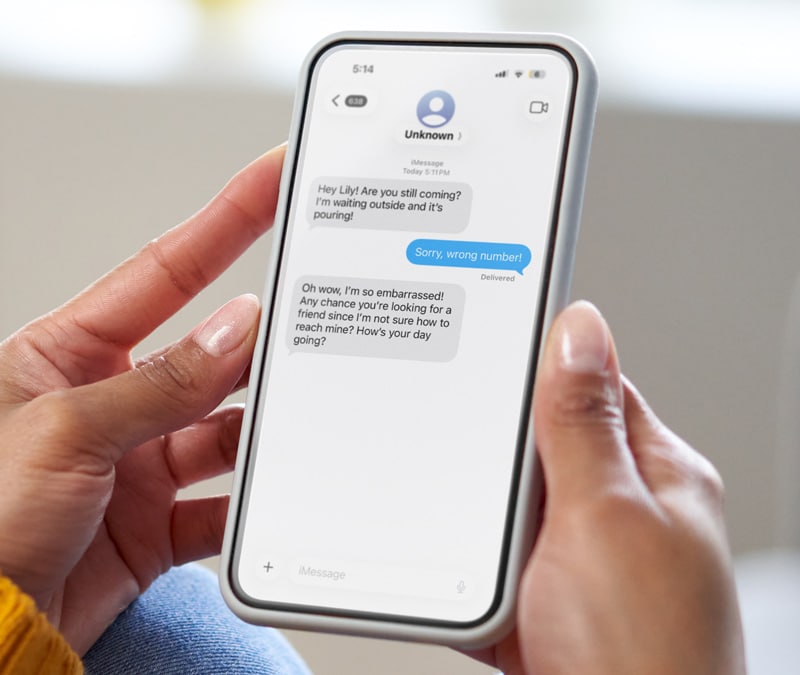AI for good — Using AI to help protect against scams
Scams are getting more difficult to detect, but we’ve prepared for it. Today, Norton is taking a groundbreaking leap with integrating Scam Protection — our latest innovation in AI-powered scam detection and cybersecurity — into the Norton Cyber Safety lineup.

You might get one while you’re out at dinner … or while you’re on the couch as you’re enjoying a book. You could even receive one during your vacation in a faraway place. Ping! That familiar sound announces a text message.
At first glance, the message looks legitimate. You’re about to click away like usual. But suddenly, you’re just not quite sure if you should click on that link after all.
Is that a real alert from your bank? Has your account really been compromised? It would be ideal to have a friend who’s an expert on scams to look over your shoulder. They could instantly tell you if your suspicions are correct or if you don’t need to worry. Enter Norton.
Building on the success of our original Norton Genie scam-detection app, Scam Protection, our new feature across the Norton 360 plans, utilizes our advanced proprietary artificial intelligence (AI) to instantly expose online scams, so you can relax and get back to your meal, your book, or your vacation.
An AI solution designed to work with real-world problems
The inspiration behind the original Genie app stems from the understanding that cyberattackers have evolved their tactics. It’s not just about targeting systems— it’s about connecting with and exploiting people.
“Today’s scams are not the scams you’ve outwitted before,” said Leena Elias, Chief Product Officer at Gen. “Gone are the days when you could spot a scam a mile away with the naked eye. Scammers are tapping into AI to speed up their schemes and make them more believable. Couple that with the sheer volume of emails, texts, and calls we’re getting every day; it’s clear we need technology on our side to help us avoid becoming the next scam victim.”
Our original Genie app detects scams by scanning text and images to identify modern, hard-to-spot scams. Not only does it analyze text and links but also looks for subtle emotional and contextual cues within messages to identify advanced scams. It empowers users to stay safe in an increasingly connected and complex world.
But we asked ourselves: how could we get more of Genie to more people? We used the learnings gathered by the original Genie app to create Scam Protection, a part of the Norton 360 mobile and desktop app experiences. This expansion will help keep users Cyber Safe from more types of scams without needing to use a second app.
Seamless integration across Norton Cyber Safety products
Scam Protection is embedded into the Norton Cyber Safety lineup at no additional cost. This expansion adds new layers of protection to help keep you safer from online scams.
Features include:
- Safe SMS: Alerts users to suspicious texts, ideal for mobile-first scam detection using Genie’s tech.
- Safe Web: Identifies risky websites during online browsing and shopping.
- Genie AI-powered scam detector: Use an AI assistant to get real-time feedback on scams and suspicious offers with a single tap. You can also ask it if a question if you feel something’s ... strange.
- Genie dashboard: It will show useful stats, like how many scams Genie has detected.
However, for Norton 360 with LifeLock Select, Advantage, and Ultimate Plus plans, we’ve added Scam Protection Pro, which includes the features above, and adds:
- Safe Call: Blocks fraudulent calls or labels incoming calls so people can decide whether to answer or block.
- Safe Email: Proactively flags suspicious patterns in email communications before you even open them, using Genie’s tech.
For Norton 360 with LifeLock Ultimate Plus users, Scam Protection Pro goes even further, including Scam Support and Reimbursement that provides up to $10,000 in coverage for certain types of scams.
A look behind the tech
Many scam checking tools rely on their ability to analyze a web link. A link known to be dangerous is blocked, and the user is protected. But, when messages don’t contain links, or the links are unknown, they can slip through security tools unhindered.
Genie’s AI engine doesn’t just rely on links and known bad websites. It analyzes the contextual elements of the message, looking at what the words mean in the same way a human would — and a scam expert at that.
Genie combines its text analysis with our in-depth understanding of Cyber Safety. The comprehensive analysis allows Genie to provide timely warnings to users, even for previously unseen scams.
Even if these scams are designed to fool you and other security tools without known bad links, or without links at all, Scam Protection can detect scam threats from a mile away. This happens proactively, in real-time, without your needing to lift a finger to find out if that text, email, or website is a scam. And if you find something suspicious online, you can always seek advice from the Genie AI-powered assistant feature whenever you feel like something isn’t quite right.
Moving forward to help keep you Cyber Safe
It’s not just about defending against threats — it’s about empowering users to make informed decisions and enhancing their digital independence and safety. The Norton Cyber Safety lineup, now with Scam Protection, represents more than just a technological advancement — it's a tectonic shift in how people manage their personal cybersecurity and interact with AI. With it, Norton keeps paving the way into a new era of AI-powered cybersecurity.
Disclaimer: Some new scam protection features will be gradually rolled out to existing Norton customers.
Editorial note: Our articles provide educational information for you. Our offerings may not cover or protect against every type of crime, fraud, or threat we write about. Our goal is to increase awareness about Cyber Safety. Please review complete Terms during enrollment or setup. Remember that no one can prevent all identity theft or cybercrime, and that LifeLock does not monitor all transactions at all businesses. The Norton and LifeLock brands are part of Gen Digital Inc.






Want more?
Follow us for all the latest news, tips, and updates.